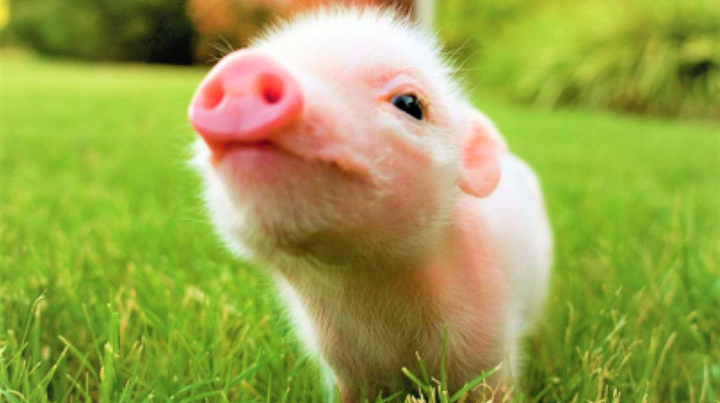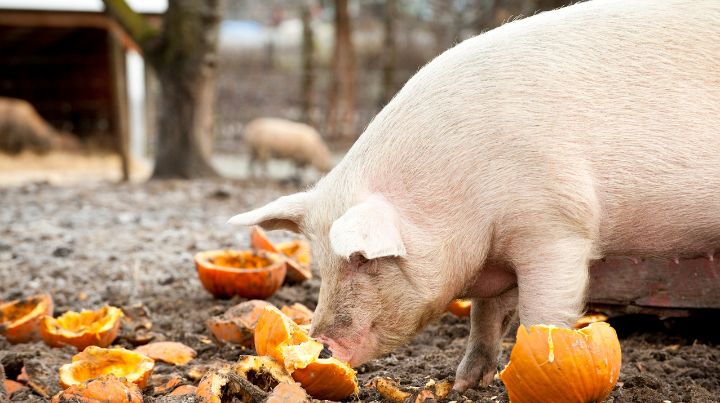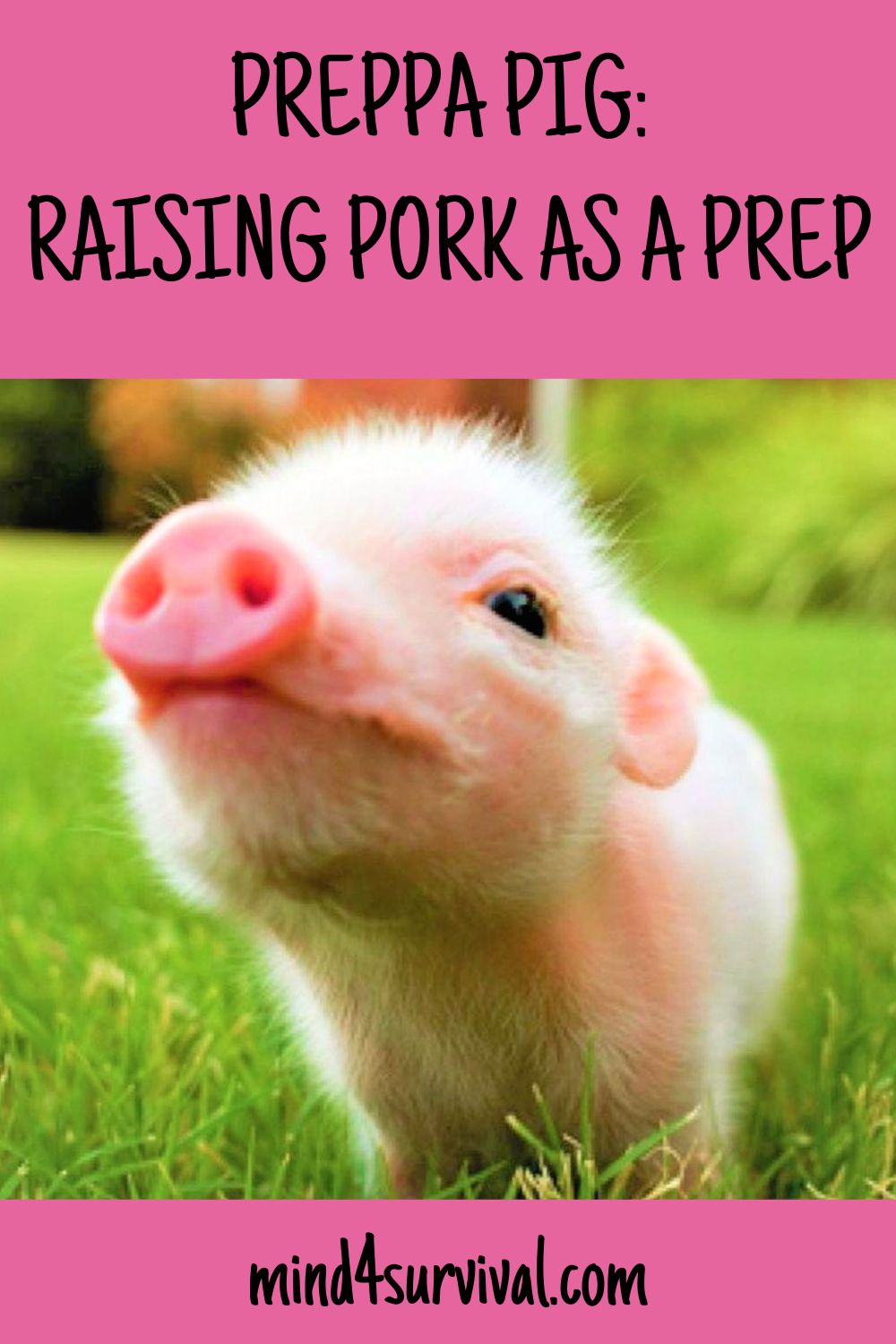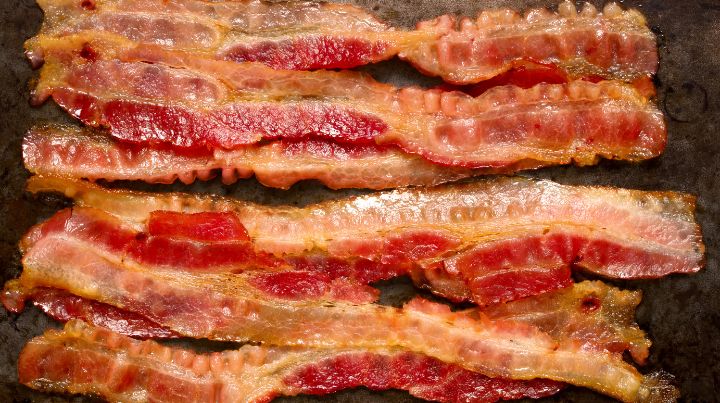Preppa Pig: Raising Pork As A Prep

“Chickens are the gateway drug to livestock” is a common joke among hobby farmers, and it was very true in my case. If chickens have gotten you hooked on raising your own meat and you’re looking to knock things up a notch, consider raising pigs. They’re fun animals that don’t take up a huge amount of space and taste great.
Living Quarters
Before acquiring any livestock, you have to have fencing in place. For pigs, this means hotwire. They are intelligent, curious, excellent diggers, and natural escape artists. Nothing else will work unless you have the skills and money to put in a concrete foundation. I don’t, but my teenagers and I can run hotwire, which keeps our pigs where we want them. Their noses are quite sensitive, and they only need to get zapped once before leaving the fence line alone.
Similarly, their housing needs to be driven into the ground. A little shed, like a doghouse, will only work when they are very small. When they were older, my kids and I drove T-posts into the ground and slid pallets over them to provide a windbreak. Then, we stretched a tarp over the top to provide shade. We also gave the pigs straw bales.
At first, I put straw bales around the pallets, thinking they would simply provide an additional insulating windbreak. But the pigs had their own idea. They pulled the bales to pieces, dug an enclosure in the sheltered area, and packed the straw in with mud to build an earthworks.
My area has cold snaps now and again. Ahead of one particularly cold front, I tossed a bag of fleece from the dirtier parts of my alpacas to my pigs, and they incorporated it in with the straw, making themselves a cozy nest.
Pigs can keep themselves pretty warm. If you have heavy snows, obviously they need shelter, but in general, you need to worry more about the heat. Pigs can’t sweat, which means they need shade and a mud pit to keep themselves cool. I keep multiple large buckets of water; the pigs drink from one or two and use the others for their wallow. In scorching weather, we spent a few minutes pouring water on them with the hose, too. They like that a lot.
When I started raising pigs, their natural cleanliness surprised me more than anything else. They build themselves nice little homes, and they don’t soil them. They keep all their waste at the perimeter of their enclosures. Given enough space, they keep their wallow and nest quite clean. My kids and I were surprised; on wet days, our dogs smelled considerably worse than the pigs!
 Food
Food
Pigs will eat anything. In fact, their ability to turn kitchen scraps into fertilizer is one of their many advantages. However, you still need to make sure that their diet is generally balanced. Likewise, you shouldn’t give them cooked bones for the same reasons you wouldn’t give them to your dogs. I’ve used feed from a local producer as the base of their diet. Buying a feeder like this one is worth the money because, as we found out quickly, pigs will tip over troughs, make messes, and generally play with whatever they’re given.
Some people rotate pigs throughout a series of pastures. Because they are so sensitive to hotwire, this is pretty doable if you have the space, shade in each enclosure, and the ability to move their food and water. Pigs can digest grass, and fresh grass does them good when they can get it. I don’t have the space for multiple enclosures, so I supplement their feed with hay. They play with some of it, but they eat most of it.
I also supplement their diet with leftover materials from processing chickens. My kids and I process our own chickens, and when we’re done, we split the heads, feet, guts, and feathers among the dogs, the pigs, and the compost heap.
And the pigs also get plenty of extras, not only from my garden but from my neighbors’ gardens, as well.
Processing
The only major downside to raising pigs is that the processing is relatively difficult compared to other animals. First of all, if you only raise pigs on a small scale, they become as friendly and affectionate as dogs. I’m not very sentimental in general, but I have a hard time saying goodbye to pigs.
Second, the processing itself is complicated. Pigs can get big; I had relatively small Kune Kunes, and even they weighed about three times as much as I do. I could physically hoist a lamb over a rafter to hang it; I just can’t do that with a pig. Bacon and ham need to be cured, and while many people do this at home, it’s a skill that requires extra equipment and that I personally have not perfected.
Because of the size and the space required for processing pigs, I take them to a custom processing facility. And while the processors do a fantastic job, loading pigs onto a trailer to get them to the processing plant can be unbelievably frustrating. The next time I get pigs processed, I plan to put the trailer inside their enclosure about a week before the processing date and start feeding them inside it so that they will be used to it. I have tried luring them in with food, but they were just too smart and naturally suspicious to go in the first time I attempted that.
The Products
Having said all that, if you already have a smoker, are used to processing other kinds of animals, and have a fair amount of space and physical strength, learning how to process your own pigs could be worthwhile.
Almost everyone loves bacon, sausage, and ham. I’ve raised a variety of animals over the years. Some people like goat and lamb meat; many don’t. Likewise, a few people are willing to cook whole chickens; many aren’t. However, bacon, ham, and sausage are great gifts or bartering items. For example, I don’t have my own snowplow. My neighbors do, however, and it’s nice to have something to give in return when they help me.
While people usually think about meat coming from pigs (and with good reason), the fat also has many applications. When I get my pigs processed, I ask the butcher to throw in the large strips of fat. I slice the fat into pieces no wider than half an inch, put them in the crockpot with about a half cup of water, and set them on low for about 10 hours. At the end, when most of the fat has been melted, I pour it through a coffee filter over a mesh strainer and into a glass jar. Filtered well, I have kept lard in the fridge for a year.
The lard you’ve rendered yourself has all kinds of uses. It’s far healthier than the ultra-processed seed oils in the store. You can substitute it for Crisco in many baking recipes. Fried eggs and vegetables are delicious in it. It also makes wonderful soap.
Producing your own food is immensely rewarding. Along with the practical benefits of having food sources aside from the grocery stores, mastery of any skill is good for your state of mind. If you have children at home, learning how to care for the needs of other creatures is good for them, too. Eating an animal you’ve raised as a family teaches children about the circle of life in a unique fashion. Kids that raise their own food do not waste it.
So keep the pig in mind! They provide more meat than chickens but don’t take up as much space as cattle. If you’re ready to take the next step on your journey toward an independent food system, raising pigs might be right for you.
Additional Resources:
- Meat Storage for When There Is No Freezer
- The Top 10 Prepper Skills to PRACTICE Before You Need Them
- Prepping is NOT Just Beans, Bullets, and Barter Items
- 7 Ways to Cook Off-Grid

Don't Miss Out!
Join the thousands of people who rely on Mind4Survival preparedness advice by subscribing to our FREE newsletter.
- Practical preparedness information
- Zero Spam
- < 0.25% of people unsubscribe




Join Mind4Survival!
Stay informed by joining the Mind4Survival! 100% Secure! 0% Spam!
Follow Us!
Affiliate Disclosure
Mind4Survival is a free, reader-supported information resource. If you make a purchase through our link, we may, at no cost to you, receive an affiliate commission.


